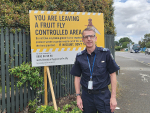Horticulture New Zealand says the recent discovery of a male Oriental fruit fly in Auckland is concerning for New Zealand growers.
The fruit fly was found late last week in a suburban backyard in Papatoetoe as part of routine surveillance.
Oriental fruit fly maggots can feed on 300 different fruit and vegetables and the fly’s preferred hosts are apples, guava, mangos, peaches, and pears.
So far, no further fruit flies have been found and Biosecurity New Zealand says its response team is making good progress, with extra traps in place, stepped up checks, legal controls introduced, special bins delivered for the disposal of fruit and vegetables, and a mobile lab put in place.
Mike Inglis, Biosecurity New Zealand regional commissioner north says there were already 187 surveillance traps in the Papatoetoe/Mangere area and over the weekend, this increased by 105.
While Biosecurity New Zealand looks for more flies, legal controls have been introduced to restrict the movement of fruit and vegetables around the area where the fruit fly was discovered to prevent the spread of any other fruit flies.
“We’ve been delivering information to residential letterboxes about the two zones affected by restrictions and people can also find full information about what they need to do here: https://www.mpi.govt.nz/fruitfly,” Inglis says.
Meanwhile, Horticulture NZ chief executive Kate Scott says her organization understands growers will be deeply concerned by the discovery.
“We are encouraged by Biosecurity New Zealand’s swift action, including increased trapping and testing in the area,” Scott says.
She says that while the Oriental fruit fly doesn’t pose a risk to human health, its establishment in New Zealand could have significant economic consequences for the horticulture industry.
“We remain hopeful that this is an isolated case and does not indicate an outbreak,” Scott says. “Growers, however, will be anxiously awaiting further updates as additional traps are monitored.”
Scott says Horticulture NZ is working closely with Biosecurity New Zealand and fully supports the introduction of legal restrictions on the movement of fruit and vegetables out of the impacted area to help contain potential spread.
She says New Zealand’s horticulture industry is a vital economic contributor, valued at over $7 billion annually.
“Protecting this sector from biosecurity threats like the fruit fly is critical to the country’s economy and reputation as a producer of high-quality produce.
“We urge everyone to follow the restrictions and co-operate with Biosecurity New Zealand to ensure this pest does not get established here,” she concludes.


















